Shares of vaccine manufacturers and healthcare companies worldwide plummeted on Friday. Investors reacted sharply to Donald Trump’s announcement nominating Robert F. Kennedy Jr. as the U.S. Health Secretary. Kennedy, known for his skepticism towards vaccines, has pledged to challenge “Big Pharma” if confirmed. This news sent ripples across the global healthcare sector.
- Market Impact: Vaccine and healthcare company stocks fell sharply after Robert F. Kennedy Jr., a vaccine skeptic, was nominated as U.S. Health Secretary. Pfizer, Moderna, AstraZeneca, and other major companies experienced notable declines.
- Industry Concerns: Kennedy’s nomination raises uncertainty for the healthcare sector, as he has pledged to challenge pharmaceutical companies and has a history of questioning vaccine safety.
- Policy Implications: If confirmed, Kennedy’s leadership could mark a departure from prior policies focused on vaccine development and drug price reductions, fueling market apprehension.
- Global Reaction: The news impacted global markets, with European healthcare companies such as Novo Nordisk and Sanofi also seeing significant share price drops.
In the United States, Pfizer’s shares dropped by over 4%, while Moderna experienced a 7% decline. AstraZeneca and GSK, listed in the UK, saw their shares fall by more than 3%. Russ Mould, investment director at AJ Bell, commented that the nomination had “spooked” shareholders, despite uncertainties about the new administration’s approach. The U.S. Health Secretary oversees a mammoth agency responsible for food safety, medical research, and welfare programs, making this position critical for the health industry.
Kennedy, often referred to as RFK Jr., has faced criticism from public health officials for propagating misinformation, according to CNBC. However, he has garnered support from those distrustful of U.S. regulators, whom they view as overly accommodating to large food and pharmaceutical companies. Previously, Kennedy had unsuccessfully run for the presidency as a third-party candidate, advocating for tighter regulations on food chemicals and more transparency from drug companies about vaccines.
If the Senate confirms Kennedy and he implements his promised policies, it would signify a shift from the previous administration’s approach. Trump’s first term saw significant investment in vaccine development, alongside attempts to reduce drug prices by facilitating medicine imports from Canada. Paul Chaplin, CEO of Bavarian Nordic, noted the mixed impact of Trump’s policies on his company, which benefited from smallpox vaccine sales. He acknowledged the current uncertainty affecting share prices, urging patience to assess future developments.
European markets mirrored these concerns. Novo Nordisk’s shares dropped over 5% in Denmark, while Sanofi, a flu vaccine leader, saw a more than 3% decrease in Paris. The potential change in U.S. healthcare leadership has sparked significant apprehension across the industry, reflecting the broader implications of political decisions on global markets.

